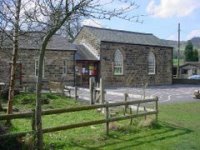"Tearing the Heart Out"
We're watching the shuffling of people in and out of Gordon Brown's* Cabinet with interest. Alan Johnson, previously responsible for schools, has been superseded by Ed Balls, in the post of Schools and Children Secretary.
That sounds like he'll want to support our campaign, doesn't it? We've written to Mr. Balls**, to see whether he'll take more interest in the threat to an excellent rural school than Mr. Johnson did. While we wait to hear back from Mr. Balls, here's something a colleague in the new Cabinet said a while ago."It is a great honour and a great responsibility to be the first ever Secretary of State for Children, Schools and Families. Children and families are the bedrock of our society and for the first time this new department will bring together all aspects of policy affecting children and young people.
"Every parent wants their child to get the best possible start in life and have the best chance to do well in school. Our responsibility will be to support families and ensure that all children and young people are safe and healthy, that they secure the highest standards of achievements, that they enjoy their childhood..."
"Rural schools are often the lifeblood of local communities.Who said that? Answers in the comments, please.
"I know there are difficult decisions which local authorities have to take. But in the case of village schools, we were right to put the village before the planner.
"Between 1983 and the beginning of 1998 there were 450 closures of rural schools - some of them tearing the heart out of local communities and villages. This is not acceptable and that is why we have made it much harder to close down the schools."
* We still haven't heard back from Gordon Brown's office. Perhaps he's been busy.
** Ed Balls' contact details are here.



.jpg)

.JPG)
.jpg)




.jpg)
